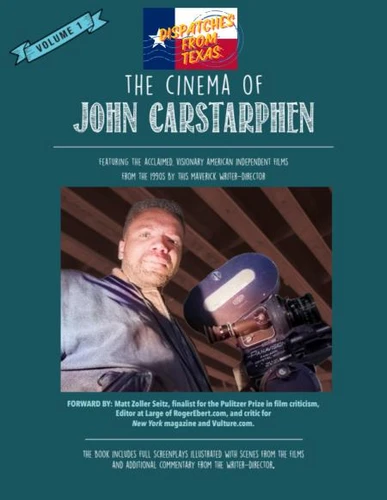Dispatches From Texas: The Cinema of John Carstarphen. The Cinema of John Carstarphen, #1
Par :Formats :
Disponible dans votre compte client Decitre ou Furet du Nord dès validation de votre commande. Le format ePub est :
- Compatible avec une lecture sur My Vivlio (smartphone, tablette, ordinateur)
- Compatible avec une lecture sur liseuses Vivlio
- Pour les liseuses autres que Vivlio, vous devez utiliser le logiciel Adobe Digital Edition. Non compatible avec la lecture sur les liseuses Kindle, Remarkable et Sony
 , qui est-ce ?
, qui est-ce ?Notre partenaire de plateforme de lecture numérique où vous retrouverez l'ensemble de vos ebooks gratuitement
Pour en savoir plus sur nos ebooks, consultez notre aide en ligne ici
- FormatePub
- ISBN8223235545
- EAN9798223235545
- Date de parution11/11/2023
- Protection num.pas de protection
- Infos supplémentairesepub
- ÉditeurDraft2Digital
Résumé
Pulitzer Prize finalist Matt Zoller-Seitz called him the "Poet of the Ellipse" for his subtle, artistic, engaging film dialogue. Philadelphia-born and raised African-American writer-director-cinematographer John Carstarphen moved to Dallas, Texas following his education at the renowned American Film Institute in Hollywood. In the ensuing decade of the 1990s, he began creating his groundbreaking cinematic works that speak to the complexities of the Black experience in the South, changing the conversation about both American cinema and the Black Southern experience.
Like Black Hollywood filmmaker Spencer Williams before him, an independent film artist who also made films in Dallas---and like many other film artists of the 1990s, Carstarphen used whatever resources were at his disposal to tell low-budget regional stories with passion and creativity. Working entirely with local actors and crew in his region of Texas, his films won multiple film festival awards and worldwide acclaim, including an official invitation to the world's most prestigious film festival, Cannes.
Volume one includes the feature-length screenplays for The Weekend of Our Discontent as well as the script for the short feature film, Mea Culpa. Each screenplay includes numerous still images from the award-winning films themselves, as well as some Director's commentary, a forward by Zoller-Seitz and a Producer's commentary by Rebecca Rice, an award-winning Queer female producer who also worked behind the scenes on these unique and powerful films.
A glossary of script film terms is included. Digitally re-mastered copies of the films themselves will be available at a later date.
Like Black Hollywood filmmaker Spencer Williams before him, an independent film artist who also made films in Dallas---and like many other film artists of the 1990s, Carstarphen used whatever resources were at his disposal to tell low-budget regional stories with passion and creativity. Working entirely with local actors and crew in his region of Texas, his films won multiple film festival awards and worldwide acclaim, including an official invitation to the world's most prestigious film festival, Cannes.
Volume one includes the feature-length screenplays for The Weekend of Our Discontent as well as the script for the short feature film, Mea Culpa. Each screenplay includes numerous still images from the award-winning films themselves, as well as some Director's commentary, a forward by Zoller-Seitz and a Producer's commentary by Rebecca Rice, an award-winning Queer female producer who also worked behind the scenes on these unique and powerful films.
A glossary of script film terms is included. Digitally re-mastered copies of the films themselves will be available at a later date.
Pulitzer Prize finalist Matt Zoller-Seitz called him the "Poet of the Ellipse" for his subtle, artistic, engaging film dialogue. Philadelphia-born and raised African-American writer-director-cinematographer John Carstarphen moved to Dallas, Texas following his education at the renowned American Film Institute in Hollywood. In the ensuing decade of the 1990s, he began creating his groundbreaking cinematic works that speak to the complexities of the Black experience in the South, changing the conversation about both American cinema and the Black Southern experience.
Like Black Hollywood filmmaker Spencer Williams before him, an independent film artist who also made films in Dallas---and like many other film artists of the 1990s, Carstarphen used whatever resources were at his disposal to tell low-budget regional stories with passion and creativity. Working entirely with local actors and crew in his region of Texas, his films won multiple film festival awards and worldwide acclaim, including an official invitation to the world's most prestigious film festival, Cannes.
Volume one includes the feature-length screenplays for The Weekend of Our Discontent as well as the script for the short feature film, Mea Culpa. Each screenplay includes numerous still images from the award-winning films themselves, as well as some Director's commentary, a forward by Zoller-Seitz and a Producer's commentary by Rebecca Rice, an award-winning Queer female producer who also worked behind the scenes on these unique and powerful films.
A glossary of script film terms is included. Digitally re-mastered copies of the films themselves will be available at a later date.
Like Black Hollywood filmmaker Spencer Williams before him, an independent film artist who also made films in Dallas---and like many other film artists of the 1990s, Carstarphen used whatever resources were at his disposal to tell low-budget regional stories with passion and creativity. Working entirely with local actors and crew in his region of Texas, his films won multiple film festival awards and worldwide acclaim, including an official invitation to the world's most prestigious film festival, Cannes.
Volume one includes the feature-length screenplays for The Weekend of Our Discontent as well as the script for the short feature film, Mea Culpa. Each screenplay includes numerous still images from the award-winning films themselves, as well as some Director's commentary, a forward by Zoller-Seitz and a Producer's commentary by Rebecca Rice, an award-winning Queer female producer who also worked behind the scenes on these unique and powerful films.
A glossary of script film terms is included. Digitally re-mastered copies of the films themselves will be available at a later date.




